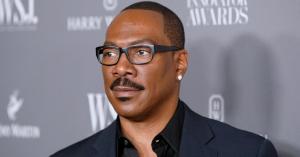Charles Manson was a mass murderer who led a cult that terrorized Southern California during the late 1960s, but his biological son still thinks Manson was misunderstood. Michael Brunner even regrets not getting the opportunity to know his father before Manson died in November 2017. Brunner gave just his second interview about his father in The Los Angeles Times last week.
“I would say 95 percent of the public looks at Charlie as this mass-murdering dog, and it’s really, obviously, just not true,” Brunner told the Times in an interview published on July 18. “He didn’t necessarily kill.”
Videos by PopCulture.com
Brunner, who was born Valentine Michael Manson, was 14 months old on Aug. 8, 1969, the day Manson sent Charles “Tex” Watson, Susan Atkins, Patricia Krenwinkel and Linda Kasabian to the house where actress Sharon Tate and four friends were staying. Tate and her friends were killed, and Leno and Rosemary LaBianca were slaughtered hours later. Meanwhile, his mother, Mary Brunner, was in jail after being arrested for stolen credit cards.
When Manson and members of the “Manson Family” cult were convicted for their murder spree, Brunner was living with his maternal grandparents in Eau Claire, Wisconsin. They later adopted him and raised him as their son.
His grandparents “gave me what I needed to survive and thrive, and pushed me through school and pushed me through sports and made sure that I was doing the right thing,” Brunner told the Times. “I have been loved.”
“I think they wanted to get rid of the Manson name because of school and to make me a little more normal,” Brunner added. “You know, so I wasn’t being pestered or bullied or that sort of thing, which didn’t happen much.”
Brunner grew up knowing that Mary Brunner was his biological mother, and his grandparents told him that a man named “Charles Manson” was his father. In elementary school, Brunner learned that Manson was more than a “crazy guy,” as his grandparents would say.
Brunner said his childhood was “99.9 percent” normal, but the “one little tenth of a percent” made things different.
“And everybody has that, really,” he said. “I mean, everybody has a little something in their history that, I’m not going to say embarrasses, but they keep in the closet. And that was my little tenth of a percent of a thing that stayed in the closet.”
The 51-year-old refused to give much detail about his life today. He now works in manufacturing and has a son in his 20s. They live “somewhere in the rural Midwest” and would not let the Times interview him near his home. This was Brunner’s first interview since he spoke to KCBS-TV in 1993, when his grandparents were being “hounded” by the media.
Recently, Brunner got interested in the “Charles Manson conspiracy” theory from Nikolas Schreck, who he now considers a “great friend.” Schrek wrote a nearly 1,000-page book called The Manson File: Myth and Reality of an Outlaw Shaman.
“Did [Manson] order these crimes? I don’t believe that he did,” Brunner said. “I believe that it was something manufactured after the fact. This ‘Helter Skelter‘ thing, when you look into it deeply, it doesn’t make a whole lot of sense.”
Brunner and Schreck think a drug deal gone bad might be at the center of the crimes, along with possibly Mafia involvement and a cover-up for Hollywood elites.
Manson was “a criminal for sure, but not this evil incarnate cartoon character that the media and the courts and now the public have believed in as the scapegoat,” Schreck told the Times.
Brunner said he ignored letters from Manson throughout his life. But just before Manson’s death, Brunner sent emails to Manson. He eventually got a postcard, on which Manson wrote, “Write on. Write, write, write on.”
Brunner never wrote back though.
“Days turned into weeks and weeks turned into months,” Brunner told the Times. “And I just never did it. And then it was too late.”
Brunner’s new interview was published just before the release of Quentin Tarantino’s Once Upon A Time in Hollywood, which references Manson and the Tate murders in the plot.
Photo credit: John Malmin/Los Angeles Times via Getty Images









